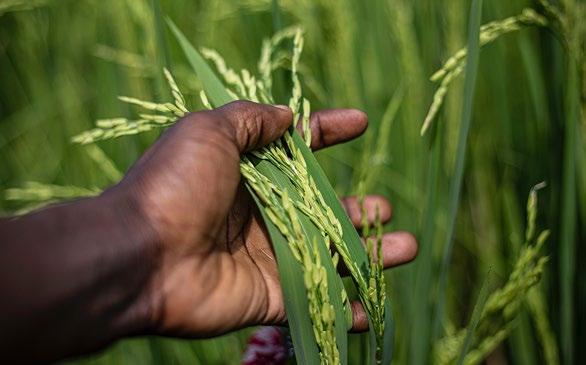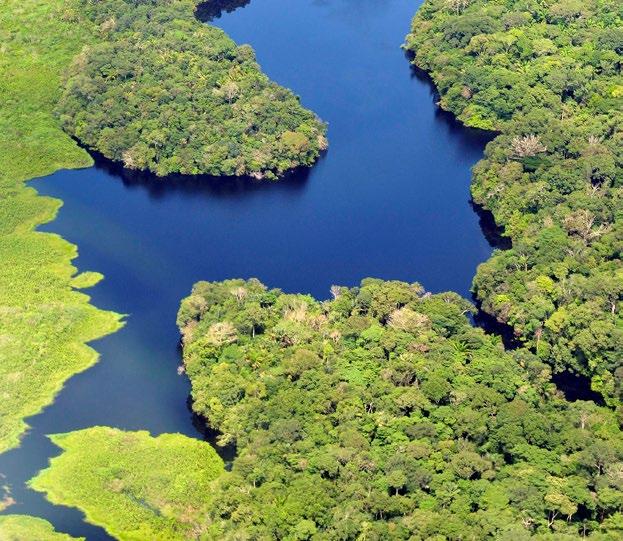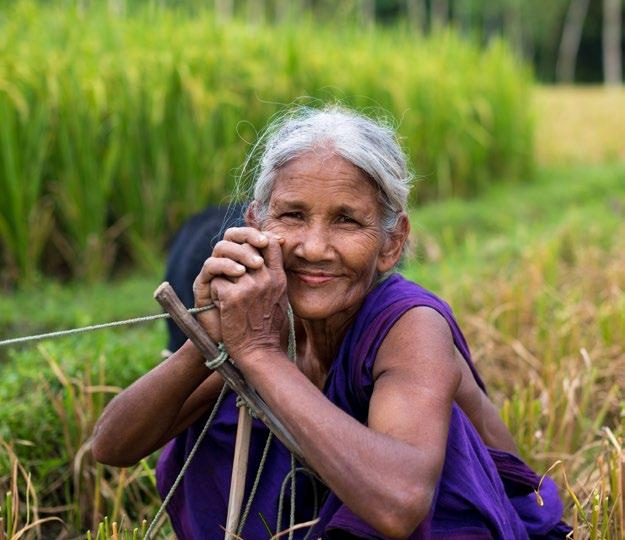Step Change is a five-year program (2022-2027) that accelerates equitable and locally led adaptation in the Global South. The program closes gaps between knowledge and action to support evidence-based adaptation.

Improving the quality of life and resilience for the most climate-affected people


.
Creating a vibrant, capacitated, and impactful community of actors driving locally led adaptation.
Recognizing the growing gaps between knowledge and action, Step Change supports knowledge brokers who link producers and users of knowledge to facilitate the generation, dissemination, and use of that knowledge.
The impacts of climate change are already being felt in the global South and are expected to increase. Poor and marginalized communities will be disproportionately affected.
An all-of-society response is needed to accelerate equitable and locally led adaptation.
What does Step Change do?





Supports the implementation of ecosystem-based adaptation to build the resilience of climate-affected communities.

Improves access to equitable finance for climate-resilient development that enables locally led solutions.
Enhances the integration of gender and social inclusion in policies and practice to achieve climate-resilient development.
Adaptation finance
Ecosystem-based adaptation
Accelerating equitable & inclusive locally led adaptation
Gender & inclusion
Capacity
Strengthening Key actors
Capacity Strengthening
Knowledge brokers
Many forms of knowledge are needed, including practical, policy, scientific, local, and indigenous knowledges.
Strengthens the capacity of key climate actors to use knowledge and implement locally led adaptation.
Strengthens the capacity of climate knowledge brokers to support locally led adaptation.
Eight core projects 16 focus countries
Where is Step Change supporting locally led adaptation?
Projects
Step Change builds on the momentum created through a previous phase of CDKN and further scales the impact of this network.
As such, CDKN plays a special role in Step Change by offering capacity strengthening opportunities to all projects, especially for effective approaches to climate knowledge brokering.
Across three continents
Regional & Global:
CDKN BAOBAB
Africa:
BRIDGE CRAKS
LAMA
DEFOCLIM SCALE PIEGIS-2AC
Climate and development knowledge network – Accelerating inclusive climate action (CDKN) (www.cdkn.org)
Advancing gender-equitable and socially-inclusive climate-resilient action by mobilizing knowledgeinto-action, capacity and Southern climate leadership from local to global levels.
CDKN is a Southern-led program founded in 2010. The program is managed by SouthSouthNorth, and implemented in partnership with Fundación Futuro Latinoamericano and ICLEI South Asia.
Programs
Global & Africa regional program
Latin America regional program
South Asia regional program
What does CDKN do?
Lead organisation
SouthSouthNorth
https://southsouthnorth.org/
Fundación Futuro Latinoamericano
https://www.ffla.net/
ICLEI South Asia
https://southasia.iclei.org/
Focus countries
Ghana, Senegal, Namibia, Kenya, Ethiopia
Ecuador, Colombia, Peru
India, Bangladesh, Nepal, Sri Lanka
CDKN accelerates inclusive climate-resilient action on climate change that is locally led and strengthens the voice and climate leadership of marginalized groups, working from community to global levels. CDKN does this by:
• Supporting the integration of gender equality and social inclusion in climate policies and practice.
• Improving access to appropriate and inclusive finance that supports locally led climate action.
• Strengthening the implementation of just and effective ecosystem-based adaptation.
Brokering innovation for decentralised climate finance & gender equality (BRIDGE)
Unlocking finance for locally led adaptation that is genderresponsive and prioritizes the most vulnerable in African cities, by strengthening knowledge brokers and their networks to address knowledge-to-action gaps.
The project is led by ICLEI Africa (https://africa.iclei.org), in collaboration with the University of Yaoundé 1 and the Special fund of equipment and intercommunal intervention (FEICOM).
Country: Cameroon
Objectives:
• Strengthen capacity of knowledge brokers and their networks to enable inclusive planning, project development, and financing for locally led and gender-responsive climate adaptation action.
• Identify and enhance the best suited mechanism(s) to unlock finance for locally led and gender-responsive climate change adaptation.
• Enhance capacity of knowledge brokers operating in central Africa to improve access and deployment of finance for locally led and gender-responsive climate change adaptation projects.
The synthesis program for African research on climate change (BAOBAB)
Unleashing new insights through synthesis of existing knowledge and data in a way that strengthens the science-policy-practice interface for more evidence-based and inclusive climate action that reduces risks for vulnerable people and places in Africa.
The project is led by the University of Cape Town (https://acdi. uct.ac.za), in collaboration with CDKN, the Africa Adaptation Initiative (AAI), and the African Group of Negotiators Expert Support (AGNES).
Countries: African countries
Objectives:
• Strengthen capacity for synthesis research in Africa and generate new insights for reducing climate change risks.
• Produce actionable research for informing climate-resilient development and for reducing climate change risks for marginalized and vulnerable groups.

• Advance southern-led synthesis research and support inclusive synthesis teams.
• Strengthen the capacity of synthesis teams and project partner organisations to act as knowledge brokers for inclusive climate action.
• Strengthen capacity for early-career African scholars and other underrepresented knowledge groups like African practitioners to take leadership roles in and contribute to synthesis research and global environmental assessments, including the Intergovernmental Panel on Climate Change (IPCC).
• Strengthen an inclusive community of practice for synthesis research on climate change in Africa.

The project is co-funded by the Climate Adaptation and Resilience (CLARE) programme (https://clareprogramme.org/), an initiative jointly designed, funded, and run by the United Kingdom’s Foreign, Commonwealth and Development Office (FCDO) and IDRC.
Locally led adaptation metrics for Africa (LAMA)
Supporting measurement and reporting on the relevance and effectiveness of locally led adaptation and strengthening the inclusion of local adaptation priorities in adaptation interventions, especially those of marginalized groups.
The project is led by the Africa Research and Impact Network (ARIN) (www.arin-africa.org) in collaboration with the University of Leeds.
Countries: Kenya and Benin
Objectives:
• Identify the priority adaptation needs and aspirations of vulnerable groups at the local level.
• Understand the progress made in capturing the needs of vulnerable groups in adaptation assessment and identify or develop approaches that can be used to capture these needs.
• Identify metrics that capture the aspirations of vulnerable communities including various gender groups and how these aspirations can be enabled in adaptation interventions.
• Align locally led adaptation metrics to national processes and gain traction in national adaptation planning, global adaptation assessment, and financial frameworks.
Mainstreaming gender equality and social inclusion in climate action for adaptation (PIEGIS-2AC)
Accelerating ecosystem-based adaptation through an intersectional and transformative approach to gender equality and social inclusion based on interactive radio and communication.
This project will be led by Farm Radio International (https:// farmradio.org), in collaboration with the Confédération Paysanne du Faso (CPF).
Country: Burkina Faso
Objectives:
• Create shared understanding on how nature-based solutions can be used to address climate adaptation needs in an inclusive manner and contribute to gender equality.
• Provide avenues for local communities, in all their diversity, to identify and express their adaptation needs and knowledge.
• Expand access to climate change adaptation information and strengthen capacity in inclusive nature-based solutions for rural communities.
• Strengthen ability of local community members to identify, articulate and develop adaptation solutions, and broadcasters’ ability to produce quality interactive programming that engages marginalized populations.
• Inform national, regional and local policies and processes on priorities, needs, constraints and local knowledge on inclusive ecosystem-based climate change adaptation solutions.

Building community resilience through strengthening agricultural adaptation knowledge systems in Uganda (CRAKS)
Improving adaptation and resilience for semi-arid and poor agricultural communities affected by climate change, especially women and other marginalized groups, by strengthening inclusive generation, dissemination, and use of local and indigenous knowledge.
The project is led by the African Centre for Trade and Development (ACTADE) (https://actade.org), in collaboration with the International Institute for Environment and Development (IIED).

Country: Uganda
Objectives:
• Strengthen collaborations and partnerships between knowledge creators and users for enhanced agricultural adaptation and resilience.
• Strengthen capabilities of national and local agricultural knowledge sharing mechanisms and platforms.
• Improve the availability, access, and use of genderresponsive adaptation knowledge and information to inform agricultural adaptation practice.
• Contribute to reforming gender and social inclusion barriers for effective locally led agricultural adaptation practices.
Decentralizing climate funds to reinforce the resilience of vulnerable communities (DEFOCLIM)
Strengthen the capacity of local and national governments to implement locally led adaptation to improve the resilience of the most vulnerable groups such as women and youth.
The project is led by IED Afrique (www.iedafrique.org), in collaboration with the International Institute for Environment and Development (IIED).
Country: Senegal
Objectives:
• Strengthen learning on locally led adaptation generated by the decentralizing climate funds mechanism.
• Strengthen the capacities of local and national institutional players to operationalize the principles of decentralizing climate funds and locally led adaptation.
• Support/strengthen the integration of locally led adaptation principles into policies and practices in favor of resilient climate action, particularly for gender equality and social inclusion.
Strengthening the capacity of the extension system to use proven knowledge and technologies to sustain equitable locally led adaptation among smallholder farming communities (SCALE)
Strengthening the capacity of the extension system to sustain locally led adaptation and recognize nature-based solutions among smallholder farming communities in a manner that will promote gender equality and social inclusion in policies and practices to achieve climate-resilient development.

The project is led by the African Technology Policy Studies Network (ATPS) (https://atpsnet.org), in collaboration with the West Africa Green Economic Development Institute (WAGEDI) and the Initiative Prospective Agricole et Rurale (IPAR).
Countries: Nigeria and Senegal
Objectives:
• Enhance the effectiveness and sustainability of the extension system in major agroecological zones of the focus countries.
• Strengthen the capacity of the extension system to provide targeted need-based capacity strengthening and technical support to smallholder farming communities to enhance agricultural productivity and climate change resilience.
• Strengthen the extension system with proven locally led adaptation knowledge and technologies that support gender equality and social inclusion for eventual deployment to the smallholder farming communities.
• Strengthen the capacity of the extension system actors to co-generate, co-transfer, and utilize proven knowledge and technology.
• Enable inclusive policies and practices, knowledge sharing, exchange, and collaborations on equitable locally led adaptation through a digital platform.
• Contribute to increased agricultural productivity and climate-resilient development by enabling inclusive policies and practices, knowledge sharing, exchange, and collaborations on equitable locally led adaptation through the digital platform.







